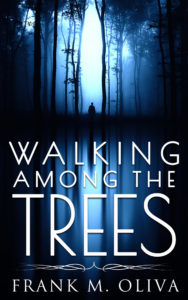An Interview with Frank M. Oliva
 Being a part of the 2021 Debuts group has allowed me to meet so many new authors. One of those is Frank M. Oliva, an author out of Long Island, New York, whose debut novel, Walking Among the Trees, launches on June 22. The book has been described as “a gripping journey through past sins and present horrors,” and “a haunting book,” and my plan is to read it as soon as my copy arrives! Like so many other authors I interview, Frank has a full plate, and sandwiching writing in and among his responsibilities is something he does every day (and something he likes to talk about!). I’m extremely grateful he found the time to answer a few questions.
Being a part of the 2021 Debuts group has allowed me to meet so many new authors. One of those is Frank M. Oliva, an author out of Long Island, New York, whose debut novel, Walking Among the Trees, launches on June 22. The book has been described as “a gripping journey through past sins and present horrors,” and “a haunting book,” and my plan is to read it as soon as my copy arrives! Like so many other authors I interview, Frank has a full plate, and sandwiching writing in and among his responsibilities is something he does every day (and something he likes to talk about!). I’m extremely grateful he found the time to answer a few questions.
Christina: Conversations you had many years ago with a priest “about the nature of good and evil” inspired your debut novel, Walking Among the Trees. What made you choose fiction—a psychological thriller!—over a book of contemplative essays or something of that nature?
Frank: This is a very fascinating question!
The truth is nothing other than fiction ever occurred to me. I think that’s partly because I’ve always been drawn to stories. For as long as I can remember, I’ve always enjoyed creative writing. I enjoyed it throughout middle and high school and always took my creative writing assignments seriously. In college, my original plan was to get a degree related to filmmaking/screenwriting because I love movies so much and wanted to write them, but I think I got spooked by the practicality of actually being able to make a living. Then later in my college years, I became interested in law and eventually made my way to law school, so my creative writing took a backseat. Then, interestingly, the very first summer after I graduated law school, I got the itch to write again and started working on a script that turned into a novel I never finished. After I gave up on that, I wrote a short story and then started Walking Among the Trees.
I think the other reason I was drawn to writing a story is that I thought there was an opportunity to explore some of the themes that come up in the mythos of demonic-possession stories—mainly the idea that the demon is able to read minds and know one’s deepest, darkest secrets and regrets. This idea has been touched on in many possession stories and films, including the Exorcist, but I always felt there was an opportunity to put that idea front and center and give it more weight. So that’s what I’ve tried to do with Walking Among the Trees.
Christina: The novel features a “young girl possessed by an invisible demon.” What research did you perform for this book? Did you encounter anything surprising? Do you believe that people are inherently either good or evil?
Frank: Overall, I didn’t have to do a ton of research because my conversations with the priest really gave me a solid framework for the themes and issues I wanted to explore. But I did have to research a couple of topics to keep things authentic enough and (hopefully) maintain the suspension of belief. For example, I had to research the medical condition catatonia (the young woman who is possessed in the story is in a catatonic state throughout the novel). I researched a handful of issues relating to Catholic priests, confession, and the procedures by which exorcisms are approved by the church. And, finally, I did a fair amount of research relating to the Vietnam War because the protagonist, Father Nathaniel Kerrigan, is a veteran.
One thing I found surprising—although I had heard a little bit about it beforehand—is that the business of exorcisms, as far as the Catholic church is concerned, is very active and seems to have become increasingly busy in recent years. It’s just so fascinating to me how this sort of seems to happen in the background, and that if you were to believe these things really do happen, that sort of means there is evil lurking all around us.
In terms of whether I believe people are inherently good or evil, I’ve always struggled with this question. The ideas of good and evil seem so relative to me, and it seems that how we perceive what is good and evil can be so heavily influenced by our own personal experience, upbringing, culture, etc. I’ve also wondered if sometimes it can be influenced by our tendency to engage in tribalism—take politics, for example, it seems to me that at least some people on both sides seem to believe that the other side is evil and out to destroy the country. Both obviously can’t be true, and perhaps the real answer is that neither is. And even if you take a really extreme example, like a murderer, rapist, or terrorist, I’m always wondering what might have influenced an individual to do such abhorrent things. And if there really are evil forces lurking around, do they play any role in influencing these behaviors?
Christina: Part of Walking Among the Trees takes place in a secluded nature preserve. Nature has the power to be both good and evil. What were your intentions in using the preserve in the story? Did a particular preserve inspire you?
Frank: Interestingly, I had been holding off on writing a story involving demonic possession because, although I knew the essence of what I wanted to do, I hadn’t yet discovered the right vehicle for framing the story and driving it forward. I also wanted to make sure I didn’t just rehash what’s already out there. Then sometime in 2016, I watched the film Jackie, with Natalie Portman, on an airplane. There are several scenes where Jackie Kennedy walks a trail lined with trees with a Catholic priest, played by the great John Hurt. In those scenes, the priest helps Jackie Kennedy process the overwhelming grief and despair she felt after the tragic assassination of her husband. After that, a light bulb went off. Wouldn’t it be interesting if you had two priests walking a tree-lined trail, with one priest seeking guidance from another, older priest? Then, as I wrote the story, I realized that there is some symbolism to having someone reluctantly traveling deeper into a dark and dreary forest while also confronting a dark past.
Christina: As a fellow parent, I know how difficult it is to juggle family, career, and writing (along with anything else you have on your to-do list!). You began this book around the time your twins were born, so how did you manage to accomplish what you set out to do? Has that practice changed over time? Furthermore, what do you do to help center yourself, and do you have any tips for the rest of us?
Frank: It was really, really hard! It sort of just happened that my wheels got turning on the novel not long before my wife gave birth to our twins. With my busy career as an attorney, a long commute to Manhattan from Long Island, and teaching a law class in the fall, there was so little time to write. To get it done, I would write for an hour or so after getting home from a long day of work and commuting, and on the weekends I would use the precious quiet time while the kids were napping to get in as many words as I could. What it ultimately meant was sacrificing the little free time I had for myself, and my wife (she’s been a fantastic supporter!). So I fell behind on reading/watching Netflix/playing video games, and almost anything else I enjoy doing. All told, it took four years from starting the novel to get where I am now. Looking back, though, although it would have been reasonable for me to put it off, I don’t have any regrets. In fact, I feel like I didn’t have much choice. The story was in me and had to come out, otherwise I truly believe I would have suffered in other ways (frustration, depression, etc.).
In terms of how I centered myself, well, I don’t think I did enough and that’s one area I’m trying to navigate as I move forward. I was so focused on getting the novel written and that was all I cared about. But I realize now that it’s sort of an unsustainable and unhealthy approach long term, and really no way to live. So I don’t have an answer on how I’m going to approach writing the next novel when I do, but I am thinking about it.
I think the only advice I can offer is not to put your dreams on hold for too long. I think we all have a tendency to want to wait until a “better” or “more convenient” time, and that time may never come.
Christina: You’re both a practicing attorney and a law professor. Did you always want to go into law? How have these experiences informed your writing?
Frank: As I mentioned earlier, I didn’t always want to go into law. It was a combination of some genuine interest coupled with my inclination to find a practical way to make a living. But I do believe that having gone through law school and practicing law for all these years has refined my thinking. It has helped me to understand the motivations that drive human beings in a way I certainly couldn’t have appreciated beforehand. I think that has certainly made me a better writer and I don’t believe I could have written Walking Among the Trees without that experience.
Christina: When did you first consider yourself a writer? And if you could tell your younger writer self anything, what would it be?
Frank: I know this is an issue all writers struggle with. I didn’t consider myself to be a writer until I finished the first draft of Walking Among the Trees. I remember printing out the draft in hard-copy and holding all of that paper in my hands—I think having something physical to hold on to made it feel more real for me. That’s when I really began to feel like a writer. Don’t get me wrong, though. There were several moments of doubt afterwards, especially as the rejections began to pile up. But still, that was a pivotal moment.
In terms of advice for my younger writer self, I think I would simply tell myself to keep going. But perhaps that applies to my current self, too . . . .

Frank can be found in multiple places!
Website: http://frankmoliva.com/
Instagram: @frankoliva1284
Twitter: @FrankO1284
Facebook: @FrankMOliva
Thanks to Frank for agreeing to this interview! If you know of an author who’d like to be featured in an interview (or you are an author who would like to be featured), feel free to leave a comment or email me via my contact page.
